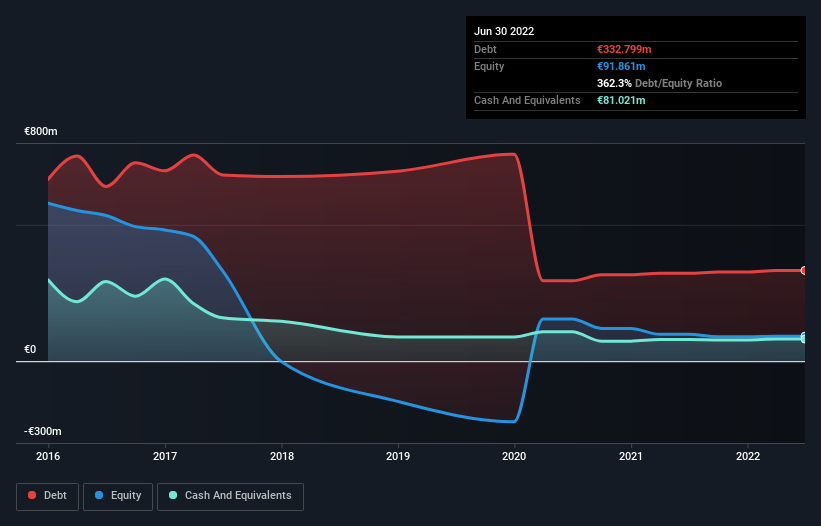
The external fund manager backed by Berkshire Hathaway's Charlie Munger, Li Lu, makes no bones about it when he says 'The biggest investment risk is not the volatility of prices, but whether you will suffer a permanent loss of capital.' It's only natural to consider a company's balance sheet when you examine how risky it is, since debt is often involved when a business collapses. We note that TREVI - Finanziaria Industriale S.p.A. (BIT:TFI) does have debt on its balance sheet. But should shareholders be worried about its use of debt?
When Is Debt Dangerous?
Debt and other liabilities become risky for a business when it cannot easily fulfill those obligations, either with free cash flow or by raising capital at an attractive price. Part and parcel of capitalism is the process of 'creative destruction' where failed businesses are mercilessly liquidated by their bankers. However, a more frequent (but still costly) occurrence is where a company must issue shares at bargain-basement prices, permanently diluting shareholders, just to shore up its balance sheet. Of course, plenty of companies use debt to fund growth, without any negative consequences. The first thing to do when considering how much debt a business uses is to look at its cash and debt together.
Check out the opportunities and risks within the IT Construction industry.
What Is TREVI - Finanziaria Industriale's Net Debt?
The chart below, which you can click on for greater detail, shows that TREVI - Finanziaria Industriale had €332.8m in debt in June 2022; about the same as the year before. On the flip side, it has €81.0m in cash leading to net debt of about €251.8m.

How Healthy Is TREVI - Finanziaria Industriale's Balance Sheet?
The latest balance sheet data shows that TREVI - Finanziaria Industriale had liabilities of €486.9m due within a year, and liabilities of €152.2m falling due after that. Offsetting this, it had €81.0m in cash and €284.7m in receivables that were due within 12 months. So its liabilities outweigh the sum of its cash and (near-term) receivables by €273.4m.
This deficit casts a shadow over the €55.8m company, like a colossus towering over mere mortals. So we'd watch its balance sheet closely, without a doubt. After all, TREVI - Finanziaria Industriale would likely require a major re-capitalisation if it had to pay its creditors today. The balance sheet is clearly the area to focus on when you are analysing debt. But it is future earnings, more than anything, that will determine TREVI - Finanziaria Industriale's ability to maintain a healthy balance sheet going forward. So if you want to see what the professionals think, you might find this free report on analyst profit forecasts to be interesting.
In the last year TREVI - Finanziaria Industriale wasn't profitable at an EBIT level, but managed to grow its revenue by 9.5%, to €506m. We usually like to see faster growth from unprofitable companies, but each to their own.
Caveat Emptor
Importantly, TREVI - Finanziaria Industriale had an earnings before interest and tax (EBIT) loss over the last year. Indeed, it lost €597k at the EBIT level. If you consider the significant liabilities mentioned above, we are extremely wary of this investment. That said, it is possible that the company will turn its fortunes around. Nevertheless, we would not bet on it given that it vaporized €10m in cash over the last twelve months, and it doesn't have much by way of liquid assets. So we consider this a high risk stock and we wouldn't be at all surprised if the company asks shareholders for money before long. The balance sheet is clearly the area to focus on when you are analysing debt. But ultimately, every company can contain risks that exist outside of the balance sheet. For instance, we've identified 2 warning signs for TREVI - Finanziaria Industriale (1 doesn't sit too well with us) you should be aware of.
Of course, if you're the type of investor who prefers buying stocks without the burden of debt, then don't hesitate to discover our exclusive list of net cash growth stocks, today.
Valuation is complex, but we're here to simplify it.
Discover if TREVI - Finanziaria Industriale might be undervalued or overvalued with our detailed analysis, featuring fair value estimates, potential risks, dividends, insider trades, and its financial condition.
Access Free AnalysisHave feedback on this article? Concerned about the content? Get in touch with us directly. Alternatively, email editorial-team (at) simplywallst.com.
This article by Simply Wall St is general in nature. We provide commentary based on historical data and analyst forecasts only using an unbiased methodology and our articles are not intended to be financial advice. It does not constitute a recommendation to buy or sell any stock, and does not take account of your objectives, or your financial situation. We aim to bring you long-term focused analysis driven by fundamental data. Note that our analysis may not factor in the latest price-sensitive company announcements or qualitative material. Simply Wall St has no position in any stocks mentioned.
About BIT:TFIN
Adequate balance sheet with moderate growth potential.
Market Insights
Community Narratives




